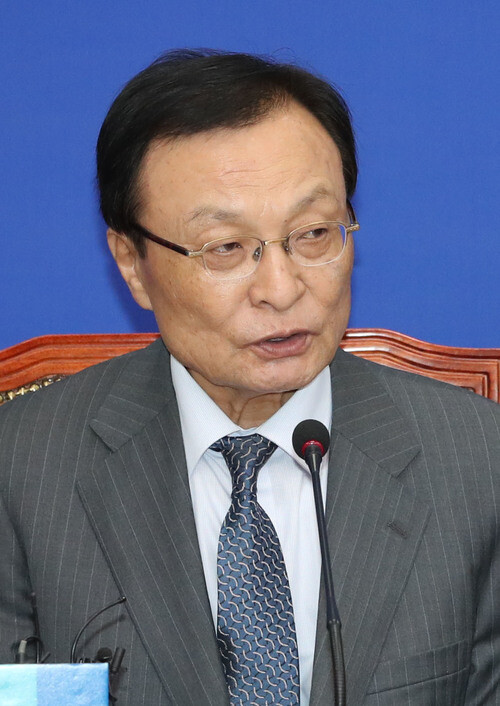hankyoreh
Links to other country sites 다른 나라 사이트 링크
Lee Hae-chan responds to controversy over remarks on revising National Security Act

South Korean Democratic Party leader Lee Hae-chan has responded to a political controversy over remarks he made in Pyongyang about revising the National Security Act by saying that a peace treaty would have to be signed first.
Lee addressed his National Security Act remarks at a press conference on Oct. 9 that was organized to report the results of delegations from the Democratic Party to North Korea and to the US.
“North Korea-US dialogue has to take place and lead to a peace treaty before we can start talking about institutional improvements. Talking about institutional improvements so soon would be putting the cart before the horse,” he said.
“Now that we’re moving from a framework of division and confrontation to one of peace and coexistence, we need to be considering institutions and laws that are suitable for that. I was saying that the National Security Act is one of those.”
While visiting North Korea to attend a ceremony marking the 11th anniversary of the Oct. 4 Declaration, Lee had said, “In order for a peace regime to take effect, we need to talk about what to do with the National Security Act.”
Lee also dismissed opposition party complaints about Lee’s pledge to keep his party in power for 20, or even 50, more years by jokingly noting that he wasn’t likely to live 20 more years himself. These remarks are regarded as an attempt to avoid controversy given the crucial need for cooperation from the opposition party to secure the National Assembly’s ratification and approval of the Panmunjom Declaration.
The ruling Democratic Party had been trying to engineer the ratification of the Panmunjom Declaration by allying with the Bareunmirae Party and three reform-minded parties (the Democratic Party, Party of Democracy and Peace, and Justice Party) while sidelining the Liberty Korea Party, but when the Bareunmirae Party decided not to ratify the declaration on Oct. 8, the Democratic Party was forced to alter its strategy.
Lee addressed this situation in the press conference: “North Korea is going to be holding more meetings with the US and with South Korea, and if those meetings get positive results, there’s going to be more public demand for the declaration’s ratification. While keeping an eye on the situation, we’ll attempt to convince the Bareunmirae Party and the Liberty Korea Party [to ratify the declaration] within the year if possible.” These remarks indicate that Lee hopes to pressure uncooperative political parties with public opinion.
The chief negotiators for the inter-Korean parliamentary meeting that’s projected to be held as early as next month will be Won Hye-yeong, a five-term lawmaker with the Democratic Party, representing South Korea, and An Dong-chun, vice speaker of the Supreme People’s Assembly, representing the North.
During his trip to the North, Lee said, he’d repeated his request for a parliamentary meeting, and the North had responded by agreeing to hold a meeting despite acknowledging concerns about there being parties in South Korea that oppose such a meeting. But further negotiations are necessary to decide whether the meeting will be held in Pyongyang or in Seoul.
By Um Ji-won, staff reporter
Please direct comments or questions to [english@hani.co.kr]

Editorial・opinion
![[Column] Park Geun-hye déjà vu in Yoon Suk-yeol [Column] Park Geun-hye déjà vu in Yoon Suk-yeol](https://flexible.img.hani.co.kr/flexible/normal/500/300/imgdb/original/2024/0424/651713945113788.jpg) [Column] Park Geun-hye déjà vu in Yoon Suk-yeol
[Column] Park Geun-hye déjà vu in Yoon Suk-yeol![[Editorial] New weight of N. Korea’s nuclear threats makes dialogue all the more urgent [Editorial] New weight of N. Korea’s nuclear threats makes dialogue all the more urgent](https://flexible.img.hani.co.kr/flexible/normal/500/300/imgdb/original/2024/0424/7317139454662664.jpg) [Editorial] New weight of N. Korea’s nuclear threats makes dialogue all the more urgent
[Editorial] New weight of N. Korea’s nuclear threats makes dialogue all the more urgent- [Guest essay] The real reason Korea’s new right wants to dub Rhee a founding father
- [Column] ‘Choson’: Is it time we start referring to N. Korea in its own terms?
- [Editorial] Japan’s rewriting of history with Korea has gone too far
- [Column] The president’s questionable capacity for dialogue
- [Column] Are chaebol firms just pizza pies for families to divvy up as they please?
- [Column] Has Korea, too, crossed the Rubicon on China?
- [Correspondent’s column] In Japan’s alliance with US, echoes of its past alliances with UK
- [Editorial] Does Yoon think the Korean public is wrong?
Most viewed articles
- 1[Column] Park Geun-hye déjà vu in Yoon Suk-yeol
- 2Will NewJeans end up collateral damage in internal feud at K-pop juggernaut Hybe?
- 3N. Korean hackers breached 10 defense contractors in South for months, police say
- 4[Guest essay] The real reason Korea’s new right wants to dub Rhee a founding father
- 5Up-and-coming Indonesian group StarBe spills what it learned during K-pop training in Seoul
- 6[Editorial] Japan’s rewriting of history with Korea has gone too far
- 7Why Korea shouldn’t welcome Japan’s newly beefed up defense cooperation with US
- 8Terry Anderson, AP reporter who informed world of massacre in Gwangju, dies at 76
- 9Thursday to mark start of resignations by senior doctors amid standoff with government
- 10Senior doctors cut hours, prepare to resign as government refuses to scrap medical reform plan